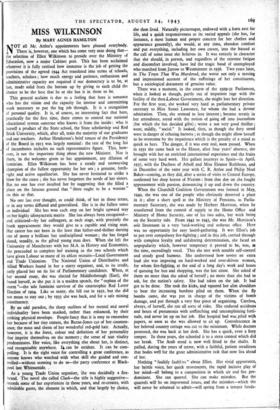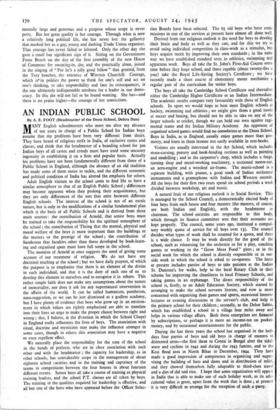MISS WILKINSON
By MARY AGNES HAMILTON
NOT all Mr. Attlee's appointments have pleased everybody. There is, however, one which has come very near doing that— the selection of Elleti Wilkinson to preside over the Ministry of Education, now a major Cabinet post. This has been acclaimed wherever it is fully realised how immense is the job of getting the provisions of the agreed 1944 Act translated into terms of schools, teachers, scholars ; how much energy and patience, enthusiasm and administrative capacity are required if our democracy is to be, at last, made solid from the bottom up by giving to each child the chance to be the best that he or she has it in them to be.
This general acclaim is due to a feeling that here is someone who has the vision and the capacity for intense and unremitting work necessary to put the big job through. It is a recognition of personal quality. It is, of course, an interesting fact that here, practically for the first time, there comes to control our national educational system someone who knows it from the inside: who is herself a product of-the State school, the State scholarship and Red Brick University, which, after all, train the majority of our graduates and our teachers. Arthur Henderson's brief tenure of the Presidency of the Board in 1915 was largely nominal: the test of the long list of incumbents includes no such representative figure. This, how- ever, is not the important thing about the new Minister. Nor is there, in the welcome given to her appointment, any dilution of feminism. Ellen Wilkinson has been a steady and unswerving champion of the fullest opportunity for her sex ; a genuine, forth- right and active equalitarian. She has never hesitated to strike a blow for the cause ; she has never forgotten the needs of her sisters. But no one has ever insulted her by suggesting that she filled a place on the fatuous ground that " there ought to be a woman" on this or that.
No one has ever thought, or could think, of her in those terms, or in any terms diffused and generalised. She is in the fullest sense an individual She has won each step on her bright upward way on her highly idiosyncratic merits She has always been recognised— and criticised—by her colleagues, at each stage, with precisely the frank appraisement they would give to a capable and rising man. Her career has not been in the least that hither-and-thither darting one of many a brilliant but undisciplined woman ; she has forged ahead, steadily, as the gifted young man does. When she left the University of Manchester with her M.A. in History and Economics, she proceeded to complete hei training in the two schools which have given Labour so many of its ablest recruits—Local Government and Trade Unionism. The National Union of Distributive and Allied Workers found in her a starry organiser, and, to its credit, early placed her on its list of Parliamentary candidates. When, at her second essay, she was elected for Middlesbrough (East), she found herself, as she put it in a maiden speech, the " orphan of the storm "—the sole feminine survivor of the catastrophic Red Letter Election of 1924. Like so many, she fell out in 1931, but she did not mean to stay out ; by 1935 she was back, and for a safe mining constituency.
By an odd paradox, the sharp outlines of her mental and moral individuality have been masked, rather than enhanced, by their striking physical envelope. People fancy that it is easy to remember her because of her tiny stature, the Burne-Jones cut of her counten- ance, the mass and sheen of her wonderful red-gold hair. Actually, however, it is the force, colour and definition of her personality that imprint themselves on the memory ; the sense of taut vitality predominates. Her voice, like everything else about her, is distinct, and recognisable anywhere. Its can be strident. It can be com- pelling. It is the right voice for controlling a great conference, as anyone knows who watched with what skill she guided and con- trolled—without seeming to do so—the party conference at Black- pool last Whitsuntide. .
As a young_ Trade Union organiser, she was decidedly a fire- brand. The novel she called Clash—the title is highly suggestive— records some of her experiences in those years, and re-creates, with admirable gusto, the element in which, and that largely by choice,
she then lived. Naturally picturesque, endowed with a keen zest for life, and a quick responsiveness to its varied appeals (she has, for instance, a most human and proper concern for her clothes and appearance generally), she would, at any time, abandon comfort and put everything, including her own career, into the hazard at the call of some issue she believes in. It was entirely in character that she should, in person, and regardless of the extreme fatigue and discomfort involved, have led the tragic band of unemployed who marched from Jarrow to Westminster in 1936. Two years later, in The Town That Was Murdered, she wrote not only a moving and impassioned account of the sufferings of her constituents, but a sociological document of genuine value.
There was a moment, in the course of the 1929-31 Parliament, when it looked as though, partly out of impatient rage with the futility of the then Labour Government, she might lose her direction. For the first year, she worked very hard as parliamentary private secretary to Miss Susan Lawrence, for whom she had a devout admiration. Then, she seemed to lose interest ; became erratic in her attendance, toyed with the notion of going off into journalism (for which she has decided gifts) ; wrote a not very good thriller ; went, mildly, " social." It looked, then, as though the fiery steed were in danger of refusing harness ; as though she might allow herself to be overcome by the impatience which is the penalty of a mind as quick as hers. The danger, if it was ever real, soon passed. When in 1931 she came back to the House, after four years' absence, she brought with her an enriched international experience and the fruits of some very hard work. Her gallant journeys to Spain—in April, 1937, with the Duchess of Atholl and Miss Eleanor Rathbone, and in December of the same year with C. R. Attlee and Philip Noel Baker—coming, as they did, after a series of visits to Central Europe, confirmed her deep horror of Nazism : from that day on shs fought appeasement with passion, denouncing it up and down the country.
When the Churchill Coalition Government was formed in May, 1940, she was one of the people who obviously deserved a place in it ; after a short spell at the Ministry of Pensions, as Parlia- mentary Secretary, she was made by Herbert Morrison, when he transferred from the control of supply to the Home Office and Ministry of Home Security, one of his two aides, her work being on the Security side. From 1942 to 1945, she was Mr. Morrison's sole lieutenant in a very hard-working and arduous office. Here was no opportunity for easy laurel-gathering. It was Ellen's job to put over compulsory fire-fighting ; and in this job, carried through with complete loyalty and unfaltering determination, she faced an unpopularity which, however temporary it proved to be, was, at the time, exceedingly vocal. This she met with notable self-control and steady good humour. She understood how severe an extra load she was imposing on hard-worked and over-driven women, for whom fire-fighting, at the end of a long day's work and hours of queuing for bus and shopping, was the last straw. She asked of them no more than she asked of herself ; no more than she had to ask, for the nation's safety. She had taken on the jab. It had got to be done. She took the kicks, and squared her slim shoulders to bear the increasing burdens piled on them. When the fly bombs came, she was put in charge of the victims of bomb damage, and put through a very fine piece of organising. Careless, always, of herself, she ran all sorts of risks. She endured accidents and bouts of pneumonia with unflinching and uncomplaining forti- tude, and never let up on her job. Her hospital bed was piled with papers, so soon as she was allowed to sit up. Convalescence in her beloved country cottage was cut to the minimum. While doctors protested, she was back at her desk. She has a quick, even a fiery temper. In these years, she schooled it to a stern control which did not break. The Arab steed is now well fitted to the shafts. It pulled, during the years of terror, with a faithful, patient steadiness that bodes well for the great administrative task that now lies ahead of her.
Nothing " faultily faultless " about Ellen. Her vivid appearance, her brittle voice, her quick movements, the rapid incisive play of her mind—all belong to a composition in which air and fire pre- dominate. She can quarrel. She can make mistakes. But the quarrels will be on impersonal issues, and the mistakes—which she will never be ashamed to admit—will spring from a temper funda- mentally large and generous and a purpose whose scope is never petty. But her great quality is her courage. Through what is now a relatively long political life, she has never lost the gallantry that marked her as a gay, young and dashing Trade Union organiser. That courage has never failed or faltered. Only the other day she gave a small but significant sign of it. Sitting on the Government Front Bench on the day of the first assembly of the new House of Commons for swearing-in, she, and she practically alone, joined in the singing of " For he's a jolly good fellow " that greeted, from the Tory benches, the entrance of Winston Churchill. Courage, which is• in politics the power to think for one's self and act on one's thinking, to take responsibility and face its consequences, is the one ultimately indispensable attribute for a leader in our demo- cracy. In this she will not fail or be found wanting. She has—and there is no praise higher—the courage of her convictions.























 Previous page
Previous page